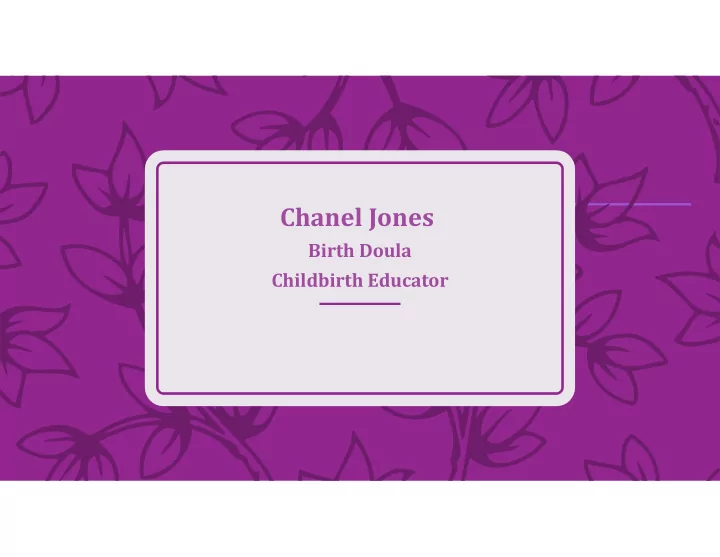

Chanel Jones Birth Doula Childbirth Educator
About me:
My Birth Experience
Birthing Trauma
My Postpartum Experience: A Dark Place
Saving Grace
Motivated
Breastfeeding How Breastfeeding Affects Maternal Mental Health By: Janet Ricketts-Simon,BA hons,CLC,LLL Co Leader,PPD,BD-LIDA (in training) Just.Right.Lactation@Gmail.com
The Other Benefits of Breastfeeding There are many other benefits besides nutrition that breastfeeding brings to both mother and baby.
Other Benefits to Baby Babies release less cortisol and therefore are less stressed. Being held close helps to regulate baby’s heart rate, breathing, digestion, and temperature. Babies feel more secure and remain secure as they develop. Breastfeeding uses all the muscles in the face and head helping to develop correctly. Sets the shape of palate and teeth, helps with eye development. Seals the gut promoting optimal health. Healthy gut equals optimal immunity.
Benefits to Mother Promotes better bonding with baby. Lowers risk of cancers (breast, ovarian, cervical, uterine). Lowers chance of rheumatoid arthritis, heart disease, Alzheimer's disease. Releases oxytocin, the calming, loving hormone which promotes relaxation in mother. If mother is supported and breastfeeding is going well, mother gets more rest - this affects the whole family.
What Does Support Look Like? Lactation Professional Peer counselor Support groups Family members
Where is this Support? WIC offices offer peer support. La Leche League offers virtual support. Hospitals offer support groups. Support is out there, however it is not always easily found. Now, due to the current pandemic, simply not having internet connection can be a barrier to finding needed support.
How does this affect Black Families? Even though there is support out there, the treatment that black families receive is not the same. There are biases based on how families look, causing many mothers to be hesitant to seek out help. This leads to high stress levels and anxiety. Especially now, due to the current health situation which deeply affects maternal mental health.
What Can We Do About This? Listen to black mothers - they need to be heard. acknowledged and valued. Important for everyone (healthcare professional and families) to be aware of their own biases. Make support services more available. Black breastfeeding week is a perfect example of letting family know that the professional help they need is out there and is available.
Normalize breastfeeding Everyone has heard “breast is best”, but often positive images and messages are targeted toward white audiences, black women and their babies are rarely seen. Black women frequently have to return to work much sooner, receive less information about breastfeeding from health providers and have less access to professional help. Also the stigma that surrounds breastfeeding in the black community is another barrier that many women face.
Breastfeeding outcomes are improving... The number of breastfeeding in the black families are getting better. With the help of social media, women are seeing other mothers breastfeeding more and more. Mothers are easily connecting and gaining peer to peer support. The access to virtual professional breastfeeding support is just a click, text, email and or call away. We still have lots of work to do, but many of us births and lactation professionals are excited and are very motivated for the challenges that lay ahead.
Recommend
More recommend